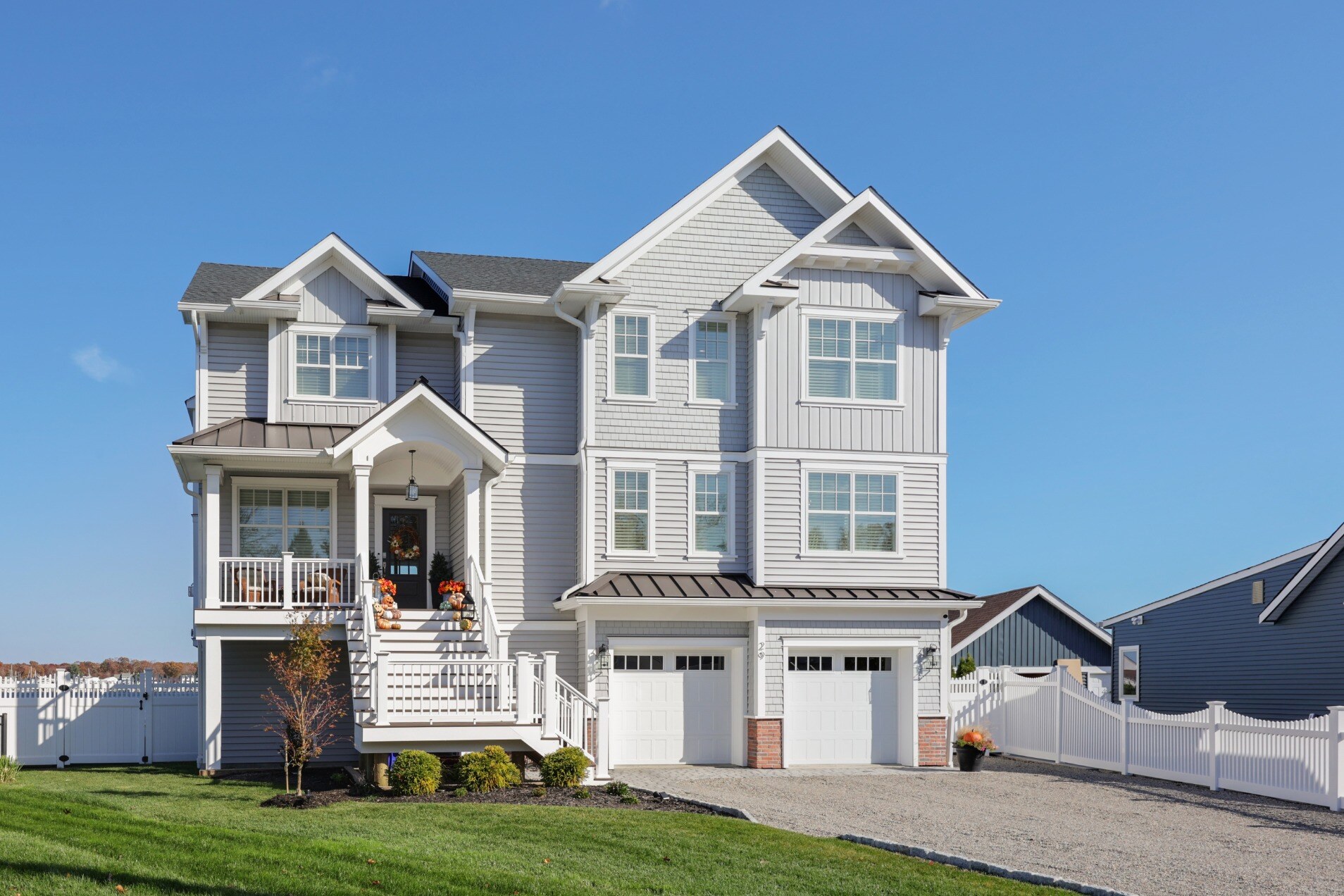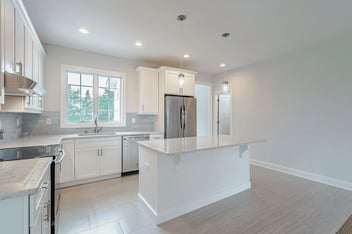5 Min Read
How to Choose a Custom Home Builder

Choosing to build a custom home is one of the most exciting and meaningful decisions you’ll ever make. It’s your opportunity to design a space that perfectly reflects your lifestyle, priorities, and taste. But just as important as your plans is the partner you choose to bring them to life. With so many custom home builders in New Jersey, it’s essential to know how to evaluate your options and select a builder you can trust.
Below, we’ll walk you through what traits make up the best builders in NJ, how to evaluate different builders, and the steps you can take to feel confident in your decision.
What is the First Step in building a custom home?
Before you start researching top home builders in NJ, the first step is to find the right builder. You want to lean in and ask yourself a few questions before you begin.
Think about:
- What style of home do you envision? From ranch layouts to luxury estates, clarity helps guide every decision.
- How much customization do you want?
- Where do you plan to build?
- What is your target budget?
Answering these questions will help you communicate your ideas clearly and identify NJ home builders with the experience to meet your needs.
Building a House in NJ
Building a home in Central New Jersey and Upper Bucks County comes with unique considerations. From local zoning rules to environmental requirements, your builder must understand the nuances of your chosen location.
For example, luxury home builders in New Jersey working along the coast must know how to protect properties from flooding and storm damage. In Hunterdon or Somerset County, your builder should be familiar with rural site development and township permitting. Local expertise helps ensure your project runs smoothly and avoids costly delays. We offer homeowner resources to help you plan ahead.
What the Best Home Builders Have in Common
The most trusted home builders share qualities that set them apart. As you start comparing custom home builders in NJ, look for these key attributes. This isn't just about showing up at the top of a search but truly proving to you that they are the right team for the job. You can also peek at these 7 mistakes to avoid to learn what not to do.
Proven Experience
Years of experience and a strong track record show a builder’s ability to handle complex projects and deliver consistent results. Look for a builder who can share examples of completed homes similar to what you’re planning. A proven reputation also means they have established relationships with trusted subcontractors and suppliers, which can help keep your project on schedule and maintain quality standards.
Honesty
Clear information about pricing, timelines, and expectations helps build trust and avoid misunderstandings. The best builders are upfront about costs, allowances, and the scope of work. They will walk you through detailed estimates, explain how they price changes or upgrades, and provide a clear contract so you know exactly what to expect before construction begins.
Clear Communication
Building a custom home involves countless decisions, and clear communication is essential to avoid confusion and stress. The best builders keep you informed at every stage, answer your questions thoroughly, and make sure you understand your options. You should feel comfortable reaching out to your builder anytime you need an update or clarification.
Flexibility and Creativity
Custom homes often require unique solutions to meet your design goals, budget, and site conditions. The right builder will be flexible enough to adjust plans when needed and creative enough to find smart alternatives without compromising your vision. Whether it’s reconfiguring a layout or recommending materials that strike a balance between style and cost, flexibility can make the experience more enjoyable.
Strong Project Management
A quality builder can organize schedules, coordinate subcontractors, and manage every phase of the project professionally. Effective project management ensures that your home progresses smoothly, inspections are passed without delays, and details are handled correctly. A builder with a proven process and reliable team can prevent costly mistakes and keep your timeline on track.
Quality Workmanship
Your home should be built to last. Look for a builder who takes pride in their work, uses durable materials, and insists on high standards at every stage of construction. From the foundation to the finishes, quality workmanship means fewer repairs later and a home that feels solid, beautiful, and well-crafted for years to come.
Effective Financial Handling
A transparent budgeting process helps you feel confident and prepared. The best builders will explain how your budget is allocated, keep detailed records of expenses, and provide regular updates on costs. This level of financial clarity enables you to plan effectively and avoid unexpected surprises, providing peace of mind that your investment is being managed responsibly.
How to Interview and Evaluate a Home Builder
When you’re comparing custom home builders in New Jersey, it’s important to look beyond first impressions and dig deeper into how they work with clients. Interviewing builders is a critical step in choosing the right partner.
Here are a few questions to ask:
- Are you licensed and insured in New Jersey?
- How many custom homes have you built?
- Can you show examples of projects similar to mine?
- What type of warranty do you offer?
- What is your estimated timeline?
- How do you handle changes or unexpected issues?
These questions will help you understand their approach and see if they’re a good fit. Of course, you can also ask other questions and go with your gut. This isn't a set plan, but rather a loose guide to help you make the right choices for your project. Below, you'll find some key criteria to consider.
portfolios
Review photos of completed homes and current projects. Look at a builder's portfolio for not only work that matches your project but breadth of experience in different types of projects. You want to see custom homes that showcase creativity and talent in all their work.
Communication Style
Notice how they respond to your questions. Do they listen carefully and explain things clearly? A builder who communicates consistently will help you feel informed and supported. When you work with our team at GTG Builders, you'll notice that we focus on education and communication. You'll leave our meetings feeling informed and comfortable with the process.
References and Reviews
Ask for references and talk to past clients. Were they satisfied with the experience? Did the builder stay on schedule and budget? Online reviews can also provide insight into how the builder manages relationships and challenges. We invite you to speak with our previous customers and see firsthand the difference that working with our team makes.
Transparency
Clear information about pricing, allowances, and timelines is essential. A reputable builder will walk you through contracts and estimates so you feel confident. When you work with our team, we walk you through the line-by-line details of your contract, so you always know what to expect and what you will be paying.
Location Expertise
Whether you’re building near the coast or in a rural area, your builder should be familiar with local codes, permits, and inspections. We know Bucks County and Central New Jersey well and use our knowledge to better your experience. You're in trusted hands when you work with our team.
Professionalism and Team Approach
A professional team can help your project run smoothly. You can learn more about our team and how our design-build approach makes all the difference in a custom home or remodel. Our process keeps your project flowing smoothly and keeps you informed.
Trust and Compatibility
Finally, trust your instincts. A great builder will make you feel comfortable and respected from the start. Hiring the right builder is all about trust. This is the foundation of every relationship, including the builder and homeowner one. We discuss ideas with you, such as whether to build a house now or wait.
Finding a Builder You Can Trust
Still wondering how you find a reputable NJ home builder? When you’re finding a builder to build a house in New Jersey, it can be tempting to focus only on the lowest bid or the fastest timeline. But building your dream home deserves thoughtful planning and a builder who takes your goals seriously. If you're getting older, building a custom home is another step in planning for your retirement.
At GTG Builders, our family-owned team has been helping clients create custom-built homes in NJ for over 20 years. As one of the most trusted home builders in New Jersey, we combine quality craftsmanship, clear communication, and expert project management to deliver homes our clients love. Whether you’re envisioning a luxury estate, a modern family home, or something entirely unique, we’re here to guide you through every step. We can help with everything from finding land for your custom home to remodeling your whole home.
Ready to Build Your Custom Home?
If you’re ready to create a space that feels like yours in every detail, GTG Builders is here to help you bring your vision to life. We specialize in luxury custom homes, with our expertise spanning Central New Jersey and Upper Bucks County. We're one of the top home and ADU builders and New Jersey, and we're ready to work with you.
Contact GTG Builders
Contact us today to schedule your consultation. Let’s discuss your goals and explore how we can bring your ideas to life as the home you’ve always envisioned.




/Spacious%20kitchen%20layout%20with%20large%20island%20and%20ample%20natural%20light%20in%20a%20net-zero%20custom%20home%20in%20Bloomsbury%2c%20NJ%20by%20GTG%20Builders.jpg?width=352&name=Spacious%20kitchen%20layout%20with%20large%20island%20and%20ample%20natural%20light%20in%20a%20net-zero%20custom%20home%20in%20Bloomsbury%2c%20NJ%20by%20GTG%20Builders.jpg)